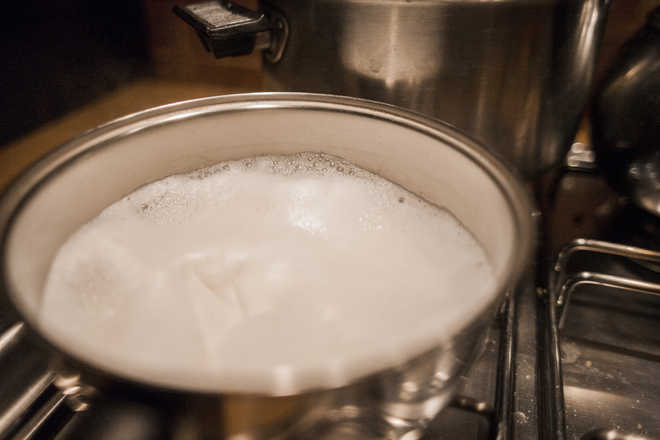Don’t keep the pot boiling
Dr A S Nanda
Traditionally, India has always been known as the land of milk and malai. Milk remains a staple in the diet of most Indians. For most children and even many adults, it is a breakfast essential. Nutritionally, milk is regarded as a complete food, as it contains protein, fat, carbohydrates, all known vitamins and various minerals essential for maintaining good health. Milk is a natural source of calcium, vitamin B12, riboflavin (vitamin B2), phosphorus and potassium. It also contains smaller amounts of other nutrients, including vitamin A, niacin, folate, vitamin B6, vitamin D, magnesium, selenium and zinc. So a glass or even two, of milk remain indispensable part of Indian diet.
There is another traditional habit associated with milk. We boil the raw milk, cool it and then use it for various purposes. This is done to make it free from micro-organisms and increase its shelf life as raw milk can get spoilt in hot, humid Indian weather.
With changing lifestyles, most people have switched over to using milk packets instead of getting raw milk from a milkman. However, this habit of boiling milk is so ingrained in our daily lives that we have continued with it even after the easy availability of pasteurised milk packets.
As per law, all standardised packed liquid milk sold in the Indian market must be pasteurised. During pasteurisation, each particle of milk is heated to 71.5°C for 15 seconds or to an equivalent time-temperature combination, followed by immediate cooling to less than 10°C. Pasteurisation makes the milk practically free from all known pathogenic bacteria with minimum nutritional loss. Hence, there is no need of reheating or boiling of pasteurised milk for consumption.
Besides, the factory-processed milk is also pasteurised to make it safe and for longer preservation. As the pasteurised milk is thoroughly checked for its safety, it can be consumed directly within the specified period (written on the packet) without further boiling. The irony, however, is that about 90 per cent Indians still boil the pasteurised milk at home before consuming it. The boiling of milk leads to up to 90 per cent losses of vitamin B1, B12, vitamin C and vitamin D, which ultimately reduces the nutritional quality of milk.
The boiling of pasteurised milk not only reduces the nutritional quality of milk, but it also leads to the gross wastage of fuel, which adds to environment pollution and climate change. Presuming that 12 lakh litres of the pasteurised milk sold in Punjab is boiled at least once, it consumes 36,400 kg of LPG that costs around Rs 19.61 lakh (cost of single boiling) and is wasted daily. It is, therefore, important to make people the aware of the nutritional loss as well as the fuel loss due to the boiling of pasteurised milk. The state authorities should make it mandatory that pasteurised milk packets should contain the message that “It is safe to consume the milk directly without boiling it”.
Milky facts
- India has remained the number one country in milk production in the world for the last two decades with annual milk production of about 166 MMT.
- While about 48 per cent of the milk is retained at producer level, of the remaining marketable surplus, 29 per cent is processed and sold.
- In 2015, the market size of pasteurised packed milk was Rs 36,000 crore (45 per cent of Rs 80,000 crore total value-added dairy products).
Whole milk 100ml
Calories 65
Sodium 40 mg
Total fat 4 g
Potassium 0 mg
Saturated 2 g
Total carbs 5 g
Polyunsaturated 0 g
Dietary fibre 0 g
Monounsaturated 0 g
Sugars 5 g
Trans 0 g
Protein 3 g
Cholesterol 0 mg
Vitamin A 0%
Calcium 15%
Vitamin C 0%
Iron 0%
— The writer is PhD (dairy cattle reproduction) and Vice-Chancellor of Guru Angad Dev Veterinary and Animal Sciences University, Ludhiana









